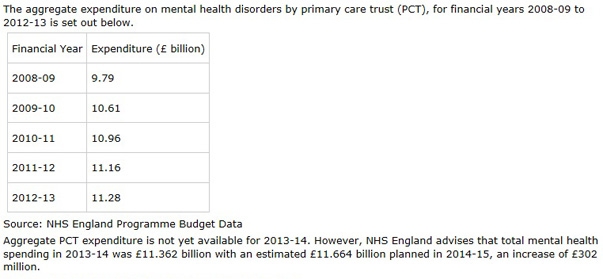The claim
 “The mental health budget has not been cut. It has actually gone up in real terms and we can show you the numbers.”
“The mental health budget has not been cut. It has actually gone up in real terms and we can show you the numbers.”
Jeremy Hunt, Channel 4 News, 24 March 2015
The background
Conservative health secretary, Jeremy Hunt, his Lib Dem colleague Norman Lamb and Labour shadow Andy Burnham had a bit of a ding-dong on Channel 4 News last week.
Both coalition ministers were keen to deny accusations from Mr Burnham that the coalition has presided over cuts to spending on mental health in this parliament:
With Liberal Democrat leader Nick Clegg promising today to spend an extra £3.5bn on mental health over the next parliament, it seems a good time to look at the coalition’s record on mental health – an area currently overseen by a Lib Dem minister.
The analysis
Mr Lamb has been asked about the mental health budget in parliament, and this is what he told MPs:
At first glance, this looks fairly straightforward.
We’ve crunched the numbers with the latest official GDP deflators to factor in inflation, and we reckon this adds up to a small real terms cut over five years: the budget was £11.71bn in 2009/10, £11.77bn in 2010/11 and £11.66bn in 2014/15.
We put this to NHS England and they told us things were far more complicated, thanks to NHS reforms which replaced Primary Care Trusts (PCTs) with Clinical Commissioning Groups (CCGs) in 2013.
They said the numbers quoted by Mr Lamb “compares spend by PCTs (this relates to years 2008/09 to 2011/12) with forecast spend by NHS England and CCGs (the figures for 2013/14 and 2014/15).
“The commissioning responsibilities for NHS England and CCGs are not the same as the commissioning responsibilities for PCTs. For example, some services that PCTs commissioned transferred to local authorities. Therefore you cannot compare the two sets of data directly…”
Mr Lamb didn’t mention any of this to parliament, but never mind.
The basic point here is that these figures don’t cover all spending on mental health. Some services are commissioned by councils, schools, the voluntary sector and so on.
This is a line NHS England have used before – most recently when presented with the results of an investigation by BBC News and the award-winning journalist Andy McNicoll from the online journal Community Care.
Using Freedom of Information requests and other research, McNicoll got data from 43 out of 56 mental health trusts in England and found there had been a real terms cut of 8 per cent in funding between 2010/11 and 2014/15, worth around £600m.
Again, the answer was that mental health services were available through other organisations. The research didn’t tell the whole story.
That’s undoubtedly true, although other figures suggest there have been cuts in other areas too.
For example, the latest stats from the Health and Social Care Information Centre show a clear reduction in spending by local councils on “adults with mental health needs”:
But hang on – NHS England said some services were transferred from PCTs to local authorities in 2013. So wouldn’t you expect the funding to go up after 2013?
And who pays for this transfer anyway? Do councils get more money from central government to cover these new services, or do they have to find the money from within their existing budgets (which sounds like a cut to us)?
We asked NHS England this question – and if there is a set of figures that does cover all the different spending streams over this parliament.
A spokesman said: “Comprehensive comparable data for years before NHSE was in existence is not available and we can’t comment on the council funding.
“We can show that spending on the services we offer for mental health (which is comparable last year and this year) has gone up.”
Mental health groups have long accused the government of a lack of candour in this area. In 2012 the government admitted that it had scrapped an annual survey of investment in mental health services.
The government’s spokesman in the House of Lords, Baroness Jolly, said this had been done to “reduce bureaucracy” but critics noted that the decision to bind the survey had been taken after it showed a fall in spending.
The verdict
All of this sounds formidably complicated, but actually the situation is fairly straightforward.
The government says it has not cut overall spending on mental health, and it says it can prove it (“we can show you the numbers”).
But when challenged, no numbers are forthcoming.
The numbers ministers have come up with in the past make it look very much like there has been a cut in real terms – as does all the other evidence we have seen.
The fact that we are having to piece together scraps of information is arguably the biggest problem here.
The coalition can’t or won’t tell us how much it has spent on mental health over this parliament – and ministers even scrapped one of the key measures after it showed there had been a cut.






